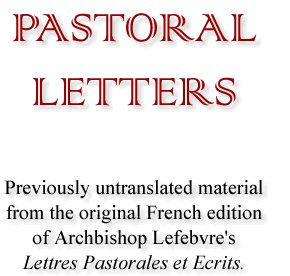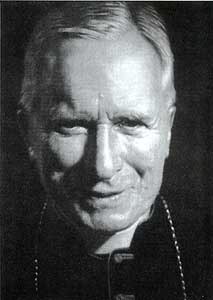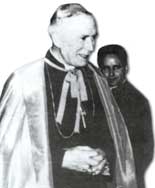Pastoral Letters
 |
 |
Letter of Archbishop Lefebvre published in Avis du mois (Sept.-Oct. 1967), the monthly letter of the Superior General of the 5,200-member Congregation of the Holy Ghost
Intervention at the General Chapter (Sept. 28, 1968)
If I was anxious to get away for a few days' peace and meditation in the city of St. Francis and St. Claire, it was in order to spend some time in closer company with our Venerable Father, rereading his writings and contemplating them in our Lord's light, rather as he himself did during his stay in Rome.
I reread with some satisfaction the Venerable Father's Instructions to members of the Congregation, his Spiritual Directory, and, in particular, his admirable commentary on the Provisional Rule of the Libermann Missionaries, which Fr. Nicolas had the providential idea of making available to us in time for this extraordinary General Chapter.
In accordance with the outline laid down in the Instructions, the Venerable Father distinguishes three essential parts of the Provisional Rule which are the foundations of the apostolic Religious Society to which we belong:
1) The definition of the Congregation, its particular apostolic goal, and a general outline of its apostolic methods.
2) The spirit of the Libermann Missionary, which will truly fit him to achieve the special apostolic goal of the Society. This is the chapter on which he especially lays stress, and to which he brings particular zeal and conviction.
3) The organization of the Congregation.
Reading these constituent documents of his, one admires the clarity of vision with which our Venerable Father continually underscores the essentials, while at the same time going into fine detail about the means to the principal end, and wisely distinguishing between those necessary means which are a sine qua non, and details which may be open to adaptation or modification.
Our Venerable Father, steeped in the Gospels, in the Holy Scriptures, having always in mind the example of our Lord's life and the lives of the Apostles, and seeing clearly that the special aim of the Congregation, which distinguishes it from all others, is the evangelization of the most abandoned souls, also sees it as self-evident that the apostolate, and especially this mission to abandoned souls, will always consist in spreading abroad the holiness of our Lord, present in the souls of the Missionaries. He cannot conceive of any apostolate, least of all the one he proposes to his sons, which can be distinct from holiness, for in the apostolate everything is our Lord's, everything is for Him and of Him and in Him. The apostolate means preaching our Lord, giving our Lord, living our Lord, in His mercy, His goodness, His meekness, His power.
For our Venerable Father holiness is essentially apostolic, and the apostolate demands holiness. He is determined, then, to provide his missionaries and future missionaries with all the means and conditions which will permit them always to seek and to acquire holiness, as priests and as apostles. Concerned as always for simplicity, and seeking the essential, the Venerable Father defines with great clarity the means which he considers indispensable for his missionaries. He does not consider them in the abstract, but, on the contrary, in concrete terms, that is to say in the context of a clearly defined apostolate among generally primitive peoples, far removed from Christian and supernatural virtues, and often requiring, on the part of the missionaries, exceptional and heroic qualities of patience, adaptability, perseverance, enlightened faith, and unfailing charity—in short, outstanding holiness.
It is with full knowledge of the facts, clarity of vision, understanding of human nature, and a remarkable spirit of faith, that our Venerable Father defines for us the means which he considers necessary for the sanctification of the Libermann Missionary, the missionary to the most abandoned souls in the mission territories. These means are:
1) The religious life, and life in community, which bring about:
2) The life of self-denial,
3) The life of prayer,
4) The life of fraternal charity, all of which are necessary for achieving holiness; and
5) Apostolic zeal, or practical union with our Lord, which brings about the spread of holiness.
 |
Archbishop Lefebvre, Superior General of the Holy Ghost Fathers, at the time of the General Council. A revolution is brewing in his Congregation which will result in his resignation. |
One could easily quote long passages from the Venerable Father's writings to demonstrate the importance he attaches to these means for a missionary of the Holy Heart of Mary. I advise you to read chapter seven of the Spiritual Directory, which speaks of the religious life, and all of the second part of the Provisional Rule and commentary, especially the parts concerning apostolic zeal. From these writings it becomes clear that our Venerable Father envisages religious life, lived in community, as no less than the essential source and the indispensable condition for his missionaries to acquire the holiness of their calling, which he defines as apostolic zeal. He describes this apostolic zeal in abundant detail, and so perfectly that he encompasses within it all the virtues of an apostle. But he does not believe that this apostolic zeal can be obtained and put into practice in the missions in a truly perfect and lasting way without the support of the religious life, lived in community. This means, essential for holiness as he conceives it for his missionaries, will obtain for them that self-denial, that total self-giving to God, that life of prayer and of brotherly support without which true apostolic zeal will be lacking.
The practical realization of the communal religious life is the observance of the rule under the direction of a Superior. Here is what the Venerable Father says at the beginning of the section entitled "Concerning the Spiritual Condition of the Congregation of Missionaries of the Holy Heart of Mary":
Just as the members of the physical body are united among themselves, so the members of the spiritual body must be bound together, and the bond which unites them is the rule. I have said before, and I say again: as long as the members of our Congregation are united we shall do much good, but woe betide us if that unity should ever be broken.
A little further on, he adds:
Community life is a life of society, of regularity, of obedience to superiors. A superior is needed first to execute the rule, and next to make use, in accordance with its spirit and aim, of what each member has to contribute to the community.
Now, we must admit, in all humility, that many of us no longer want to live this religious and community life as our Venerable Father essentially envisaged! Why pretend otherwise? For some years now, slowly, progressively, but as though inexorably, many of our confreres have ceased both to value and to practice the authentic life of a religious community. Against a life of obedience, of prudence vis-à-vis the world, of true detachment from worldly ease and possessions, against the realities of community life, which mortify us and oblige us to practice that charity which leads us to the life of prayer and meditation, against all these their individualism, their egotism, their thirst for freedom and independence have prevailed.
Many no longer wish to be truly subject to a superior, in whom we recognize the representative of God. Every permission which has to be asked of him, whether in connection with their activities or with matters of poverty, seems to them hateful and humiliating. They want to follow their conscience, their aptitudes. They refuse to recognize the special grace given to superiors to guide and direct them in what they do. They no longer want to be bound to a common rule, but to have their own personal one. Prayers, meals, recreation, sleep—all these are purely personal matters, and must not be regulated in an obligatory and communal manner. They want to go out freely, they must be trusted. They want to dress in whatever way suits them, and brook no criticism of it. All such matters are the personal concern of each individual.
In short—let us be frank—they hope and claim to surpass all their predecessors in the exercise of apostolic zeal and of sanctity by means they have chosen for themselves, that is, without the religious or community life.
But have there not been saintly secular priests, like the Curé d'Ars? No doubt, but they practiced the essence of the religious life and life in community. Those holy priests were trained in seminaries which were real novitiates of five or six years, and that left its mark on them for life.
We are going to have to choose: either we return to the religious life and life in community as our Venerable Father intended, or we abandon the Congregation, and turn it into a Pia Unio. We must also beware of this aspiration to live as an anarchic community, some kind of group with no authority, no superior. Such a so-called community life, where there is no community, where individualism is allowed free rein, can only exist as a parasite on a normal religious society, which provides it with the means of subsistence. Left to itself it does not last, but falls into decay.
Let us be frank and clear about this; no hot air, no fine literary sentences, no poetry; let us speak plainly. Do we want the authentic religious life, and authentic community life? Then let us return to what our Venerable Father tells us is essential to these two ways of living; let us return to obedience, and chastity, and poverty, as he envisages them for his missionaries; let us return to a more authentic community life, with missionaries living together, in ways adapted to different places and circumstances, under the leadership of a superior, and in a community which adopts and observes rules concerning sleep, prayer, meals, activities, outings, and the practice of poverty.
Let those who feel they can no longer accept these two foundation stones of our society, as the Venerable Father defines them, look for another society which suits them better, or found a new one. Otherwise, the renewal we desire and expect will be an illusion, our extraordinary General Chapter will merely confirm these evil tendencies towards individualism and freedom, and our society will become a caricature of a religious congregation, with members who are not religious at all, and a caricature of community life where anarchy and disorder reign, and each individual is free to do as he pleases. These tendencies have already clearly manifested themselves during the Chapter. I warn those who are allowing themselves to be influenced, and who think they are doing right by casting their votes that way. I beseech them to read the Venerable Father, and to seek their inspiration and their decisions there, not in modern trends which will wreck the Congregation. In closing I will leave you to meditate on this admirable passage from the Venerable Father:
Something which I have often thought about, and which has at times greatly preoccupied me is this: I have thought that, if it has pleased God to treat us so harshly, it is to punish us mercifully for our sins. Clearly He seems to want us to save this land more by our own sanctification than by our zeal; I mean that it seems to be God's holy will that we should live, in the midst of these peoples, a thoroughly holy life, paying particular attention to the practice of the priestly and religious virtues—humility, obedience, charity, meekness, simplicity, the life of prayer, self-denial, etc. Let us devote ourselves wholly to cultivating these virtues, and, far from in any way impeding the exercise of our missionary zeal, they will strengthen and perfect it
...What has given rise to this aberration is a false idea of who and what they are. These poor children, having left home to be missionaries, still retained this idea: "I am first and foremost a missionary!" Consequently, and without realizing it, they attached too little importance to the religious life, and gave themselves over too much, I think, to external activities.
Well now! if this conjecture is correct, it is important to enlighten these dear confreres by making them see that the mission is indeed the goal, but the religious life is the means sine qua non, and this means needs to be the focus of all their attention, the object of all their concern.
If they are holy religious they will save souls; if they are not, they are nothing, for God's blessing is linked with their holiness.
